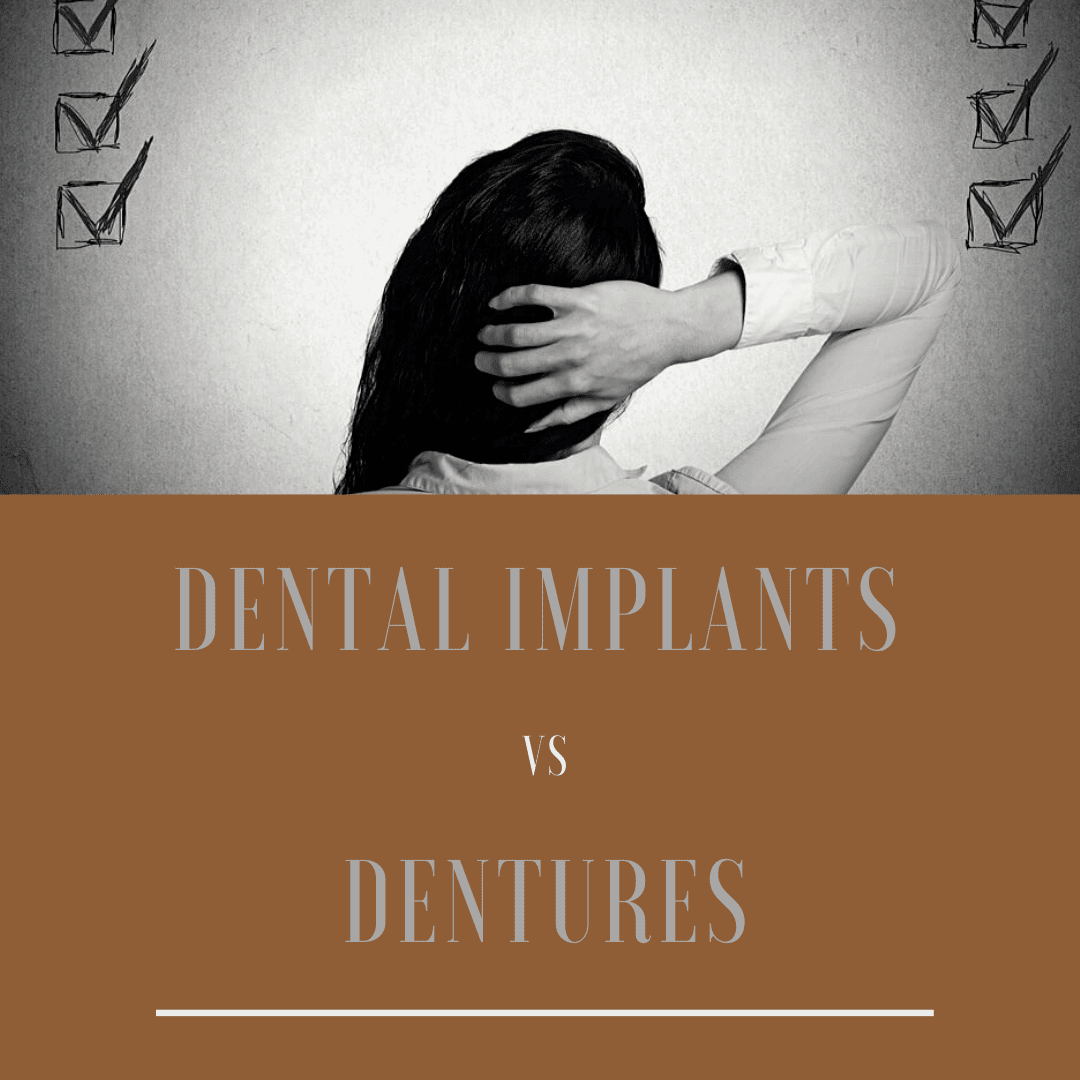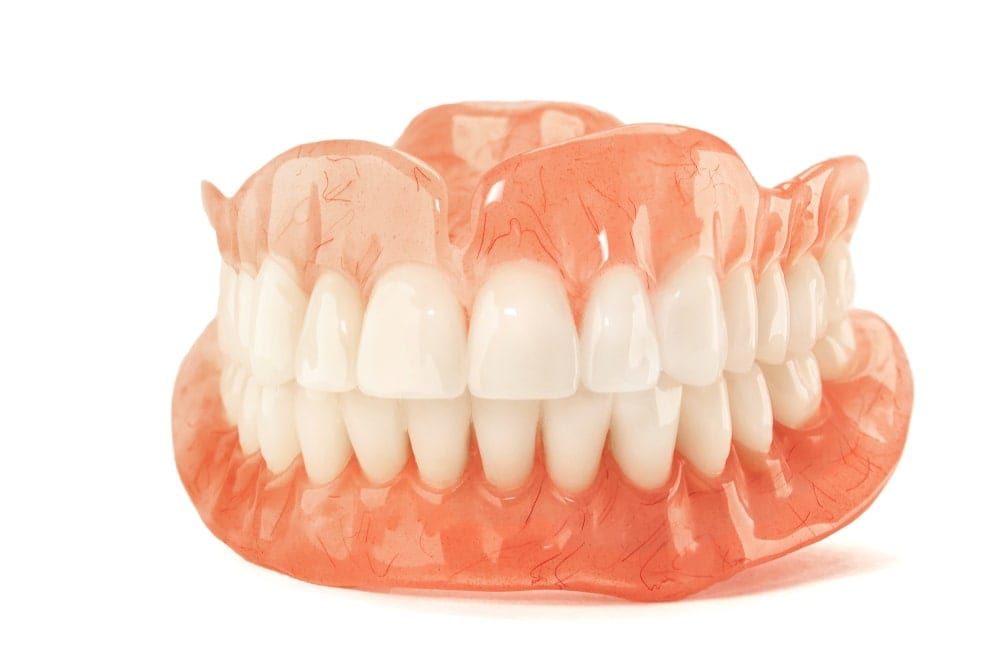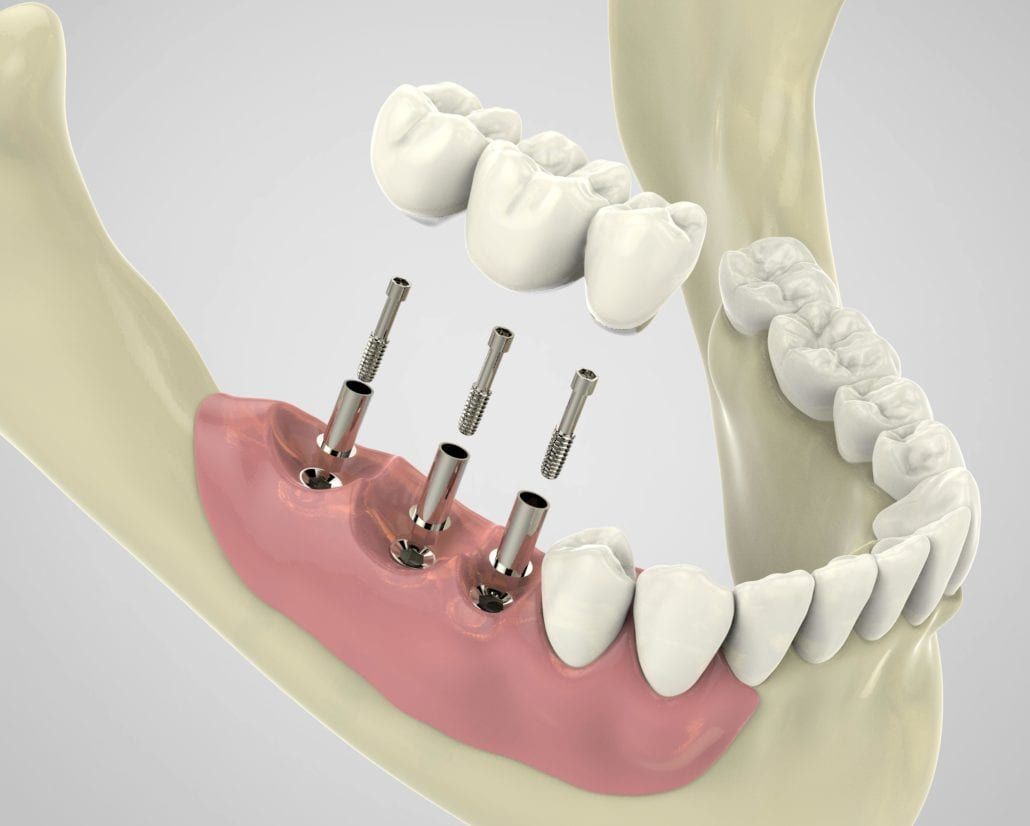Dental Implants vs. Dentures

Having one or more missing teeth is frustrating because not only does it make eating and speaking harder, but it may be noticeable when you smile or laugh. Gaps left by missing teeth can also result in eventual tooth shifting and bite problems. For these reasons, and several others, dentists recommend replacing missing teeth as soon as possible.
Luckily, there are a variety of restorations available to replace missing teeth. Two of the most common missing teeth restorations include dental implants and dentures. Although both can replace one or more missing teeth, they accomplish this in different ways. This provides you with options when it comes to deciding how you want to restore missing teeth.
Dentures

There are two different types of dentures: full and partial. Full dentures can replace an entire arch or mouthful of teeth. They are composed of an acrylic base that resembles gums and fake teeth usually made from porcelain. Full dentures are shaped so that they can fit on top of the gums and are held in place by denture adhesive. They must be removed for cleaning and at night to allow the gums to rest.
Partial dentures are used to replace a single tooth or multiple teeth that are surrounded by intact teeth. While partial dentures can use the same type of acrylic base as full dentures, they will also likely have some kind of wire framework to hold them in place. This wire framework stabilizes the fake teeth by wrapping itself around the intact surrounding teeth. Partial dentures are also removable and should be removed the same as full dentures.
Dentures require a dental impression of your mouth so a dental lab can custom fabricate them to fit over your gums. In some cases, extractions may need to be performed beforehand. Other than these possible extractions, dentures do not require any type of oral surgery. They also don’t have candidacy requirements that are as strict as dental implants and don’t require an extensive recovery period.
However unlike dental implants, dentures do not stimulate the jawbone, so the bone will eventually be absorbed back into the body in a process known as bone resorption. This will eventually cause the facial bones to change shape, meaning the dentures will no longer fit. Additionally, many people with dentures note that they slip easily and can irritate the gums.
| Pros | Cons |
| No minimum bone mass required | Will eventually need replacement |
| Easy procedure | Can slip while eating or speaking & rub gums |
| Minimal recovery period | Does not stop bone resorption |
Dental Implants

Dental implants are artificial tooth roots made from titanium screws that are implanted into the jawbone. In addition to the implant screw, a connector piece called an abutment is used to support a dental prosthesis. For a single missing tooth, an implant-supported dental crown is used. For multiple missing teeth, an implant-supported bridge or implant-supported denture can be used.
Dental implants provide stimulation to the jawbone to preserve bone mass and facial structure. Once in place, they are extremely durable and can last about 20 years if well taken care of. Implants are also the closest restoration to natural teeth and they are capable of restoring a great amount of natural chewing and biting function.
However in order to place dental implants, a minor oral surgery is needed to implant them into the jawbone. Additionally, there must be adequate bone mass around the area where the implant is being placed so that it is able to fuse with the surrounding bone. Implants that do not fuse with the surrounding bone are likely to fail and will need to be removed. To prevent this from happening, you will also need to follow special guidelines provided by your implant dentist after your implant surgery. Since it takes about 3-6 months for the implants to fuse, you will need to adhere to these guidelines until the implants have fused.
| Pros | Cons |
| Stimulates jaw bone | Requires Oral Surgery |
| Preserves facial structure | Requires adequate bone mass |
| Long-lasting & durable | Can fail |
| Restores function | Requires recovery period with special guidelines |

Dr. Lila Nabi earned her Doctor of Medical Dentistry (DMD) at the University of British Columbia and is a member of the following dental organizations: AACA, CACD, BCDA, CDA, BCDS, and KIA. She has completed extensive continuing education courses at the world renowned Kois Centre in Seattle, Washington, Oral Surgery Externship program at Loma Linda University, LA. She has also participated in over 200 hours of continuing education at the Spear Centre in Phoenix, Arizona led by Dr. Frank Spear. Dr. Nabi is active in an ongoing Implantology Study club in Vancouver.











